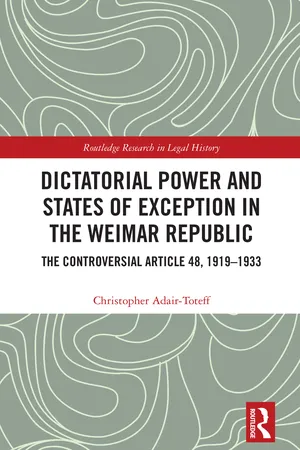
Dictatorial Power and States of Exception in the Weimar Republic
The Controversial Article 48, 1919-1933
- English
- ePUB (mobile friendly)
- Available on iOS & Android
Dictatorial Power and States of Exception in the Weimar Republic
The Controversial Article 48, 1919-1933
About this book
This book is an account of the tension between the need for order and the desire for freedom during the tense years of the Weimar Republic. It explains how various groups interpreted Article 48 of the Weimar Constitution and utilized it to reinstate peace and tranquility. While Article 48 is usually associated with the so-called Preußenschlag—the taking over of the Prussian government by the order of Reich Chancellor Kurt von Papen—it had been introduced as a necessity during earlier "states of emergency."
This investigation delves into the relevant works by many of the leading constitutional scholars in Germany. This list includes Hugo Preuss, Carl Schmitt, Hans Kelsen, Gerhard Anschütz, Richard Thoma, Erwin Jacobi, Hans Nawiasky, and Richard Grau. This book is a clearly written and detailed account of the history surrounding the debate about the appropriate emergency measures to be taken under Article 48. The work is important for its historical interest, and also because the conflict between authority and freedom has continuing relevance.
The book will be a valuable resource for researchers and academics working in the areas of Legal History, Legal Philosophy, Legal Theory, Constitutional History, and German Studies.
Frequently asked questions
- Essential is ideal for learners and professionals who enjoy exploring a wide range of subjects. Access the Essential Library with 800,000+ trusted titles and best-sellers across business, personal growth, and the humanities. Includes unlimited reading time and Standard Read Aloud voice.
- Complete: Perfect for advanced learners and researchers needing full, unrestricted access. Unlock 1.4M+ books across hundreds of subjects, including academic and specialized titles. The Complete Plan also includes advanced features like Premium Read Aloud and Research Assistant.
Please note we cannot support devices running on iOS 13 and Android 7 or earlier. Learn more about using the app.
Information
Table of contents
- Cover
- Half Title
- Series
- Title
- Copyright
- Contents
- 1 Dictatorship, State of Exception, and Article 48
- 2 1918–1919: The Years of Struggle and Renewal
- 3 1920–1922: The Years of Political and Economic Turmoil
- 4 1923–1926: The Years of Despair and Hope
- 5 1927–1929: The Years of Peace and Panic
- 6 1930–1933: The Years of Debate and Debacle
- 7 Concluding Comments
- Index